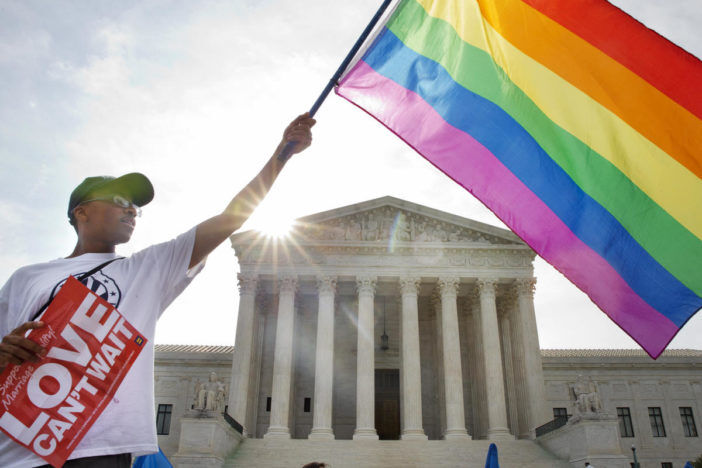New Jersey is working to quickly pass a law to protect marriage equality in the wake of increasing anxiety about what the Supreme Court’s conservative supermajority could do to LGBTQ rights.
“We have talked about this a few times in the past with our legislative allies,” Lauren Albrecht, policy consultant for Garden State Equality, told Gay City News. “We can never be sure about anything. When it comes to equal rights for our community, we can’t leave it up for chance.”
Related: Supreme Court judge says gay rights case proves vaccine mandate is illegal
On December 9, the Judiciary Committee of the New Jersey Assembly unanimously passed a bill to codify the right of same-sex couples to get married in the state. The state legislature is expected to easily pass the bill before the end of the year.
Never Miss a Beat
Subscribe to our newsletter to stay ahead of the latest LGBTQ+ political news and insights.
While marriage equality has been legal in the state since 2013, it was done so through a court ruling rather than a law. There was a bill proposed after the ruling, but it contained religious exemptions that LGBTQ advocates did not support. The bill never passed.
The new bill does not include any religious exemptions, according to Politico. A previous version of the bill included a section that said that no religious institution “shall be compelled to provide space, services, advantages, goods, or privileges related to” marriages they don’t agree with.
Churches can already refuse to perform marriages they don’t approve of, but removing that section of the bill is meant to mitigate any issues for LGBTQ couples in New Jersey should the Supreme Court overturn marriage equality.
Some Supreme Court justices have already voiced opposition to the Obergefell v. Hodges ruling, which legalized marriage equality in all 50 states in 2015.
In 2020, Justice Clarence Thomas issued an opinion that repeatedly attacked the decision as unconstitutional because it “bypassed” the “democratic process” and causes people “with sincerely held religious beliefs concerning marriage” to “find it increasingly difficult to participate in society.”
Justice Samuel Alito joined Thomas in the opinion, which said that the only solution is to ban marriage equality again.
The ACLU’s Chase Strangio noted on Twitter that it’s unusual to see Supreme Court justices openly show their desire to overturn a five-year-old decision.
“The brazenness of the rightward direction of the Court is a threat to even the most basic expectation of legal protection,” he tweeted.
And with six conservative-leaning justices on the Supreme Court, many believe LGBTQ rights now hang in the balance, especially with the court’s indication that they may be willing to overturn Roe v. Wade and allow states to further restrict or even ban abortion in the recent case of Dobbs v. Jackson Women’s Health Organization.
Legal experts say that reasoning similar to that in the Roe decision was used in Obergefell, which means if the justices are willing to overturn Roe, they may be willing to overturn another. Justice Sonia Sotomayor even accused a lawyer of “dissimulating” when he argued that banning abortion wouldn’t affect LGBTQ rights.
LGBTQ advocate Sharon McGowen of Lambda Legal told Bloomberg Law that LGBTQ victories like Lawrence v. Texas (which ended state bans on gay sex in 2003) and Obergefell “were built on the foundation of Roe and Casey and the Court’s other reproductive rights cases.”
New Jersey State Senate President Steve Sweeney (D) expressed this sentiment to Politico when explaining the legislature’s decision to get a marriage equality bill passed.
“If they can [potentially gut Roe v. Wade], same-sex marriage can be the next thing,” Sweeney said.














